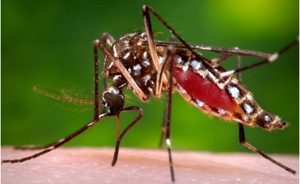First Invasive Aedes Mosquitoes Found in Contra Costa County
 CONTRA COSTA COUNTY, CA (August 5, 2022) — The Contra Costa Mosquito & Vector Control District has identified the invasive mosquito species Aedes aegypti in Contra Costa County. The mosquitoes were found in Martinez. This is the first group of invasive mosquitoes reported in Contra Costa County.
CONTRA COSTA COUNTY, CA (August 5, 2022) — The Contra Costa Mosquito & Vector Control District has identified the invasive mosquito species Aedes aegypti in Contra Costa County. The mosquitoes were found in Martinez. This is the first group of invasive mosquitoes reported in Contra Costa County.
The District is conducting surveillance and treatment in the area where these mosquitoes were identified with the goal of eliminating them before they become widespread in Contra Costa County; however, they are known to be very difficult to eradicate.
“These mosquitoes are very aggressive day-biters that can transmit the causative agents of Zika, Dengue, chikungunya, and yellow fever. They can hide among vegetation and debris which makes them very challenging to find and eliminate. As we take our responsibility of protecting public health very seriously, we are setting additional traps, and going door-to-door in an effort to find and control these invasive mosquitoes and prevent them from becoming established in the County,” said Paula Macedo, General Manager.
Aedes aegypti are not native to California but can be found around the world in tropical and subtropical areas. They are common in the Southeastern United States and Arizona. More than 10 years ago, they were first discovered in Southern California, and over the years, they have been found in communities from San Diego County north to Shasta County. In 2019, Aedes aegypti were discovered in San Joaquin, Sacramento, and Yolo Counties.
Potted plants
These invasive mosquitoes are very small (about 1/4 inch), with black bodies and white stripes. Females can lay individual eggs that can remain dormant for up to six months before being exposed to water in which they can develop from egg to adult in a week or less. They are often introduced through travel, particularly as people move from area to area and may unknowingly transport these mosquitoes in potted plants or other outdoor items.
The District asks Contra Costa County residents to tip, toss and take action to reduce the risk of these new mosquitoes.
- Toss out any amount of standing water.
- These mosquitoes’ eggs can stick to surfaces, so after dumping out the water, scrub bird baths, containers, outdoor pet dishes, garden pots for plants, and anything else that can hold water outdoors.
- And report any day-biting mosquitoes by calling (925) 685-9301 or online.
Contra Costa Mosquito & Vector Control District, an independent special district and public health agency, is located at 155 Mason Circle in Concord
